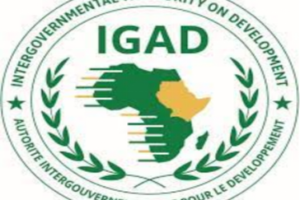
BY ADDISALEM MULAT
The Horn of Africa has faced various peace and security challenges that originate from both within the region and beyond. External forces have been working to destabilize the region, which has posed a significant threat to its sovereignty, independence, and territorial integrity. These circumstances have remained hostile and dangerous to the region. However, despite these challenges, countries in the region have remained steadfast and made significant progress towards improving the situation.
The increased militarization and confrontation in the Horn of Africa have perpetuated insecurity in the region, further destabilizing it and impeding socio-economic development. The scramble for influence among various actors has put the region in a precarious security situation, with their safety hanging in the balance. This has created a fragile security situation, whereby any miscalculation or misstep by any of the actors can lead to conflict and further destabilization in the region.
The Horn of Africa has become a battleground for various actors seeking to assert their authority and pursue their vested interests. The resulting competitive environment has further destabilized an already challenging region, leading to increased militarization, proxy conflicts, and tensions. However, efforts are being made to address the region’s problems and regional organizations and actors are working to promote peace, stability, and development in the region.
This scramble for control has created a highly competitive environment, where different groups are vying for influence and power. The situation has further destabilized an already challenging region plagued by political instability, terrorism, and socio-economic difficulties. As a result of this intense competition, conflicts have emerged throughout the Horn of Africa, leading to further instability and insecurity. The competition for control has created hurdles for addressing the area’s pressing socioeconomic and political challenges.
The Horn of Africa has faced various challenges, including those posed by malicious groups with vested interests in destabilizing the region. These entities have exploited the political, social, and economic vulnerabilities in the region to create chaos and anarchy. Their actions have threatened the safety and security of the region, leading to devastating consequences for the people. However, some countries, such as Ethiopia, have taken decisive actions to disrupt these criminal factions’ plans and prevent their destructive agendas from coming to fruition.
Ethiopia’s role in preserving the peace and stability of the Horn of Africa has been significant. Its stance against terrorism and extremism in the region has contributed to the disruption of criminal groups’ plans and increased security. Ethiopia has also engaged in regional cooperation and diplomacy to address the complex security challenges facing the Horn of Africa.
As a result of these efforts, the region has experienced a more stable and secure environment, allowing for progress towards economic and social development. The positive impact of Ethiopia’s leadership in the region serves as an encouraging example of how leaders can take a proactive approach to address regional security challenges.
The security situation in the Horn of Africa remains a cause for concern due to external forces seeking to destabilize the region. However, Ethiopia has shown unwavering commitment to safeguarding regional integrity and security. Through effective measures to combat terrorism, Ethiopia has achieved a significant and notable reduction in violent incidents in the region.
Ethiopia’s dedication to combating violent extremism serves as a testament to the power of leadership, commitment, and cooperation. The Ethiopian government has established effective measures to counter the threat of terrorism, resulting in reduced levels of violence and heightened security enforcement across the country. This impressive accomplishment highlights the importance of cultivating a culture of resilience to tackle the most intricate challenges.
However, the Horn of Africa still faces new challenges that must be met with coordinated efforts and continued vigilance. Regional stakeholders must remain attentive to emerging threats and work together to ensure long-term peace, stability, and progress for the region. By strengthening existing partnerships and engaging new allies, the Horn of Africa can build a lasting framework of security and resilience capable of overcoming any obstacle.
This competitive environment has further destabilized an already challenging region that has been plagued by political instability, terrorism, and socio-economic difficulties. The region has long struggled with issues such as poverty, lack of access to basic services, and environmental challenges. These issues have been compounded by political unrest, conflict, and violence, making it even more challenging to address the root causes of the region’s problems.
Instead of working together to create a better future for the region, each group is focused on advancing its own interests. The resulting deadlock has only made it more challenging to bring lasting peace and stability to the troubled region.
The increased militarization and confrontation perpetuate insecurity, further destabilizes the region, and impedes progress on socio-economic development. As the actors compete for influence, member countries in the region are facing a precarious security situation, with their security balances hanging in the balance. While some efforts have been made to mitigate these challenges, the situation remains fragile, and the region continues to be a hotbed for instability.
Ethiopia has taken a firm stance against terrorism in the region, recognizing the potential for devastating impacts of terrorist activities. The country has invested significant resources in preventing radical groups from establishing a foothold in the area, and disrupting their activities. Through its actions, Ethiopia has become an example for neighboring states on how to tackle the threat effectively.
The region’s strategic position, which gives it access to key waterways and trade routes, has also made it an attractive target for external actors seeking to exert their influence in the region. The competing interests of these actors have led to increased militarization, increased proxy conflicts, and increased tensions in the region. This has worsened an already difficult humanitarian situation, with millions of people in the region facing food insecurity, displacement, and other forms of humanitarian crises.The Ethiopian government has been active in countering extremist groups in the Horn of Africa.
The military has been engaged in various operations to root out these groups, both within Ethiopia and across borders. The government’s efforts to combat terrorism have been critical in promoting stability and security in the region. This has been especially important given the challenges posed by extremist groups that have been known to operate across borders and infiltrate neighboring countries.
Ethiopia’s unwavering commitment to anti-terrorism efforts has resulted in a significant improvement in regional security. Despite the challenges, the government remains steadfast in its resolute stand against terrorism, and this has helped to build a sense of solidarity and cooperation among countries in the region in their efforts to combat this common threat.Ethiopia has prioritized internal peace and reconciliation, with a concerted effort to prevent conflicts before they escalate. Through continuous dialogue and reconciliation efforts, the government is working diligently to address the root causes of conflict and promote lasting peace.
Radicalism and violent extremism pose a significant threat to the prosperity and stability of countries worldwide. Ethiopia recognizes the need for greater cooperation among stakeholders to eliminate the menace of terrorism, which has led to the loss of lives and economic downturn. To this end, the Ethiopian government has directed its resources towards championing regional integration through its leadership in counter-terrorism efforts.
Through collaboration with these organizations, Ethiopia has gradually been able to build the foundation for regional cooperation, as exemplified by its continuous efforts to eliminate terrorism and related crimes within the region.
Ethiopia has been proactive in partnering with other countries to develop coalitions and share intelligence concerning terrorist plots that could be targeting the region. These efforts are proof that Ethiopia is committed to curbing terrorism and ensuring more stable and peaceful societies long-term. With continued collaboration among stakeholders within the region and globally, Ethiopia has made significant progress in building a society free of extremism and terrorism.
The positive changes in the Horn of Africa demonstrate that effective leadership and regional cooperation can bring peace, stability and development. The collaboration among Horn countries creates various opportunities for economic development that could benefit not only the region but also neighboring countries. However, to ensure that progress continues, countries should remain committed and work together for a common goal of regional peace and stability. With sustained cooperation, the region can achieve a new era of prosperity and stability.
Regional stability is vital for the development and prosperity of the Horn of Africa. Leaders in the region are working tirelessly to combat terrorist groups and restore peace. Ethiopia has demonstrated its commitment to these efforts, leading the fight against terrorism. Ethiopia’s unwavering stance against terrorism demonstrates its commitment to resolving conflicts and promoting regional integration, as well as fostering economic growth.
The Ethiopian government has launched numerous initiatives aimed at intercepting and preventing violent extremist activities. Some of these measures include working with international partners to develop counter-terrorism capacity, establishing legal frameworks to prosecute terrorist suspects, and increasing surveillance and security operations across the country.
By minimizing the threat of terrorism, Ethiopia is protecting the safety and wellbeing of its citizens and contributing to stability across the Horn of Africa. As a result of these efforts, Ethiopia has experienced a significant decline in the incidence of terrorist attacks and violence in recent years.
The Ethiopian herald April 27 /2023





